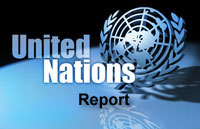Activists: U.S. failures in AIDS battle missing from global conference

UNITED NATIONS (FinalCall.com) – A three-day high-level AIDS conference offered the United States a chance to show off its international funding prowess against the pandemic, but failed to highlight the government’s failure to implement an effective strategy against the disease, said domestic AIDS groups.
The conference was designed to review country by country as well as regional and global progress of anti-AIDS efforts over the last 27 years and was tied to UN declarations. The General Assembly wants reviews of country plans against AIDS and 192 nations committed to regularly report on their progress. The U.S. is among those nations but failed to give an update on national efforts at the conference, which opened June 10.
“This failure to follow through on their pledge to the global community embodies the U.S. government’s stagnant and reductive approach to health rights and HIV,” said a 2008 National Youth Shadow Report published by the youthaidscoalition.org. Shadow reports are independent analysis from advocacy or non-profit organizations and are often critical of official government responses.
The United States, the world’s biggest donor of AIDS-related funding, is itself facing an AIDS epidemic and the situation grows worse each year, said Joya Banerjee, of the Global Youth Coalition. “The Bush administration is in denial about the reality of the AIDS pandemic on the ground in America,” Ms. Banerjee told The Final Call.
The highest ranking member of the U.S. delegation was Ambassador Mark Dybul, an assistant secretary of state and the U.S. AIDS coordinator, who talked about the $18.8 billion President Bush donated to fight AIDS globally through prevention, treatment and care. While much remains to be done, the skeptics have been proven wrong, he said.
“Millions of people are on life-saving antiretroviral treatment in developing countries. Millions more have benefited from prevention and care programs,” Amb. Dybul argued.
The other major speaker from the U.S. was Anthony S. Fauci, director of the National Institute of Allergy and Infectious Diseases at the National Institutes of Health, who is considered an “eminent expert” by the United Nations. “In summary, during the first 27 years of the AIDS pandemic, much has been accomplished, but we are sobered by the many challenges that remain,” said Dr. Fauci.
“The administration’s strategy is to speak only of what they see as theirgood charity work abroad; and to ignore the failure to make progress on combating the pandemic here in the U.S.,” said Ms. Banejee.
Both U.S. speakers failed to mention that domestically there has been an 80 percent boost in HIV in among Black gay males ages 25-34 or that HIV/AIDS is the number one cause of death among Black women ages 25-34, according to Centers for Disease Control figures.
The New York-based Gay Men’s Health Crisis complained that the CDC “quietly released their report in March, as they joined AIDS activists across the nation in calling for a national AIDS strategy, adequate funding and political leadership.”
The Youth Shadow Report included a statement from AVERT, an international HIV/AIDS charity based in the United Kingdom, which said, “The U.S.A. has no formal AIDS strategy, and thousands of uninsured Americans struggle to access good HIV care and antiretroviral therapy.”
Another New York-based advocacy organization, CHAMP (Community HIV/AIDS Mobilization Project), attacked the Bush administration and said on its website: “The U.S. requires countries applying for global AIDS funding to have a national AIDS strategy, yet we don’t have one of our own. Instead we’ve got a chaotic and under funded CDC dog-and-pony show passing out pledge cards.”
The pledge card reference referred to a March 2007 CDC requirement that leaders of Black AIDS organizations fill out cards saying they would promote HIV prevention in the Black community. The CDC called the initiative the “Heightened National Response to HIV/AIDS” and it touted “expanding the reach of prevention services; increasing opportunities for diagnosing and treating HIV; developing new effective prevention interventions, and mobilizing further community action.”
According to CHAMP, however, “One year later, the HNR, as it is called, has been marked by shifting leadership, lack of communication with local leaders and community organizations, and no more funding for any initiative besides those restricted by HIV testing.”
The U.S. has only HIV testing as its national strategy and the only thing the administration may feel good about after 27 years is the “reduction in mother-to-child transmissions,” AVERT said.
“These are the issues we wanted to address before the General Assembly, but we were only allowed to attend small workshops; so the international community only got to hear the administration’s feel good speeches,” said Ms. Banejee. The international community really thinks the U.S. is a model country because it doesn’t see “the lack of honesty and the lack of funding” of the Bush administration, she added.












